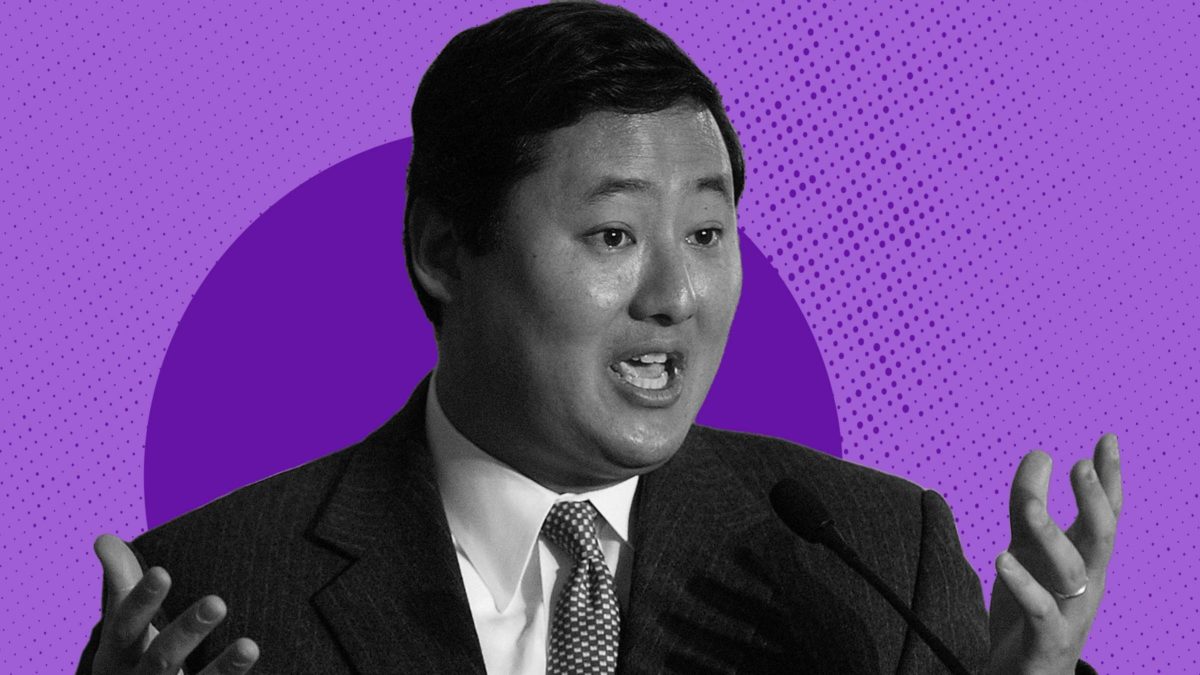All careers end. They just don’t all end the same way. Some people pull a graceful Calvin Johnson and retire at the top of their games, perhaps too early but with their dignity intact. Others stay in the job for years, transforming into shells of their former selves, perhaps longing to walk away but unsure what else they’d do with their time once the spotlight is finally, blessedly on someone else.
Particularly in sports, that decline can be perversely funny. The first time I saw 40-year-old alleged sex offender Ben Roethlisberger trot onto the field and spray a half-dozen passes to nobody, I laughed for half an hour. But after a four-month NFL season of watching the same thing over and over, it wasn’t funny to me anymore. I was just watching a guy be bad at his job in public.
One of the chief legal architects of America’s Bush-era torture program, John Yoo, is going through a similar career twilight. After burning hot and bright as a young law professor-turned-waterboarding justifier, his career has been about as boring and pathetic as the last few years of Ben Roethlisberger’s. Just like Big Ben, what started out as funny is turning more and more dreary as he shamelessly copies whatever the day’s conventional conservative wisdom happens to be. (Also like Big Ben, he will likely never face the justice he deserves.)
Had you met a young Yoo in the 1990s, you would have been hard-pressed to predict a decline like this. He did everything a rising right-wing lawyer should: clerking for a Reagan nominee on the D.C. Circuit, and then for Justice Clarence Thomas on the Supreme Court, and then working on the Republican-led Senate Judiciary Committee before scoring a prestigious tenured professorship at Berkeley Law. These days, he teaches courses on separation of powers and the history of the Constitution’s framing, which are only occasionally interrupted by protesters dressed in the familiar orange jumpsuits of the Guantanamo Bay prisoners whose torture he helped facilitate.
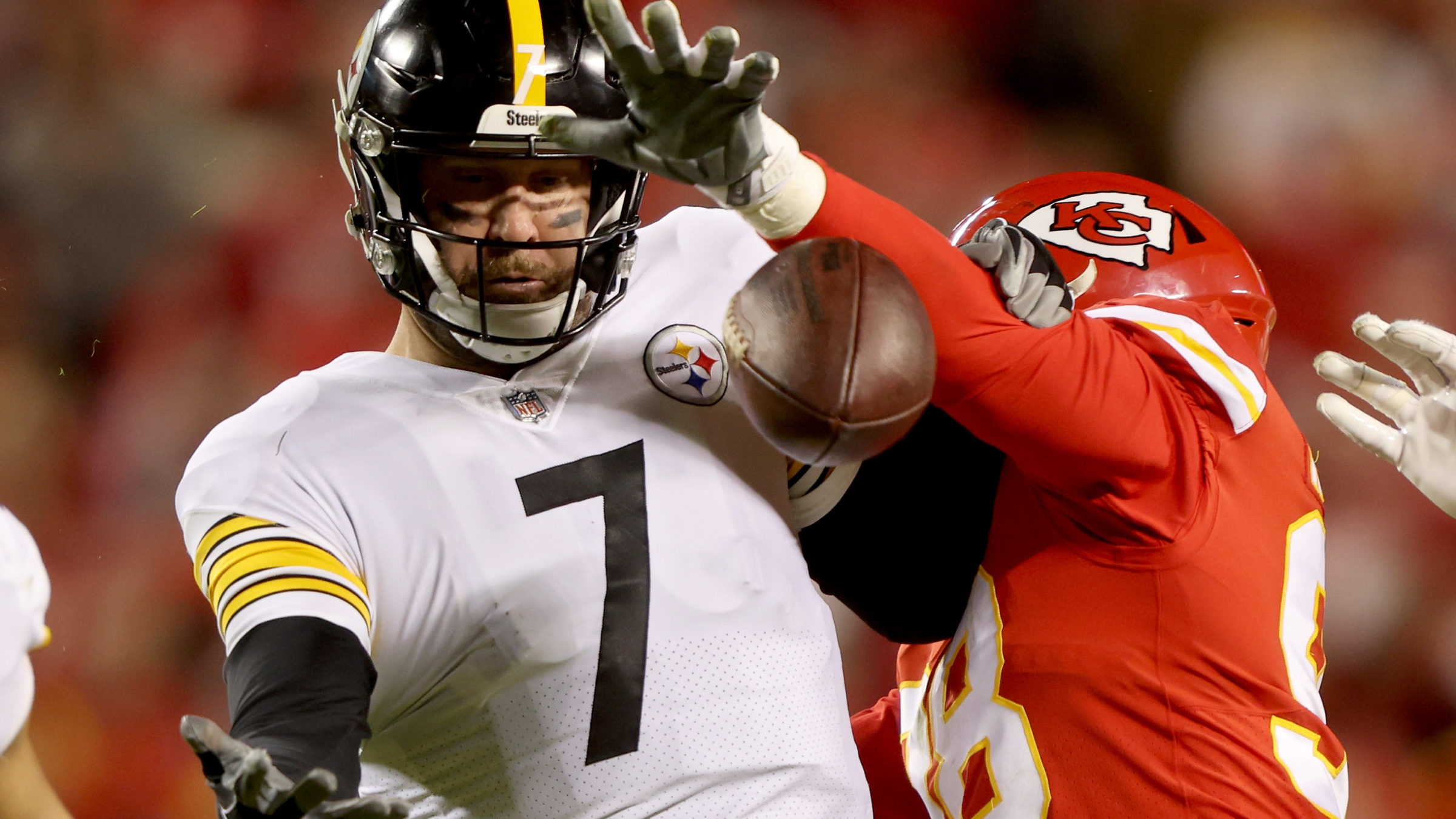
Pictured L-R: John Yoo; relevance; time (Photo by Jamie Squire/Getty Images)
Much of Yoo’s early-career scholarship focused on a simple question: whether treaties matter. Article VI of the Constitution provides that treaties are the “supreme Law of the Land” and override any state law to the contrary. Way back in 1796, the Supreme Court recognized that treaties are often self-executing—that once the president signs a treaty with the support of two-thirds of the Senate, Congress didn’t need to pass any additional laws to implement them, because “from the nature of them, they require no further act to be done.”
This is sometimes a problem for conservatives. The states are laboratories of reaction, fiefdoms for used car dealers in gerrymandered districts to enact laws restricting abortion rights, empowering police, and stopping minorities from voting. And the United States is a party to a lot of treaties, from treaties that regulate harms to migratory birds to the humane treatment of prisoners of war. The more treaties the Senate endorses, the more federal law they’re making, and the more state laws they could be preempting.
Luckily for conservatives, sometimes a treaty isn’t self-executing. For example, American treaty negotiators sometimes explicitly agree that a treaty will only take effect once Congress passes a law to implement it. But Yoo had the insight to push this argument to its absolute limit: Over multiple law review articles, he argued that as a general rule, treaties aren’t self-executing, regardless of what the treaty actually says.
This flew in the face of an emerging academic consensus that courts should respect and uphold treaties as binding law in individual cases. His contemporaries saw his position as extreme, pointing out that courts would undermine the plain text of Article VI if they cast treaties as mere suggestions without an act of Congress to implement them. But Yoo recognized the threat that international agreements posed to his political project and he reacted accordingly.
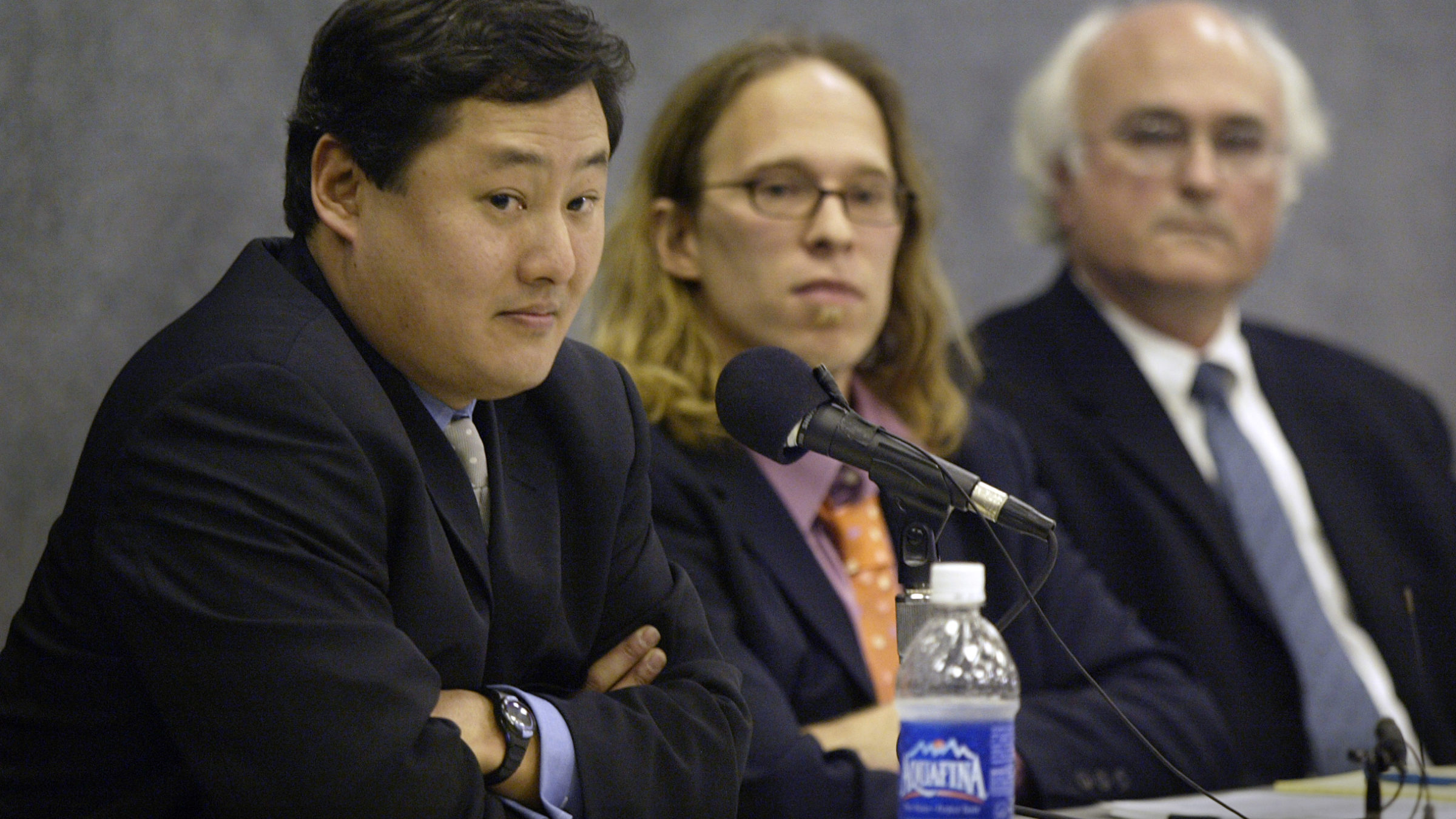
(Photo by Robert Lachman/Los Angeles Times via Getty Images)
Yoo wasn’t just a Republican hack, though. He had principles. Specifically, he supported any president’s authority to unilaterally start wars. In 2000, he wrote glowingly about President Bill Clinton’s authority to order American troops into what was then Serbia, as well as Clinton’s other military actions in Sudan, Afghanistan, Somalia, Macedonia, and Rwanda. Congress didn’t usually authorize these missions, but Yoo argued that claims of a “unilateral executive war power” could “find support in the Constitution’s text and original understanding.” The egghead “international law scholars” who whined about Congress’s enumerated responsibility to declare war, according to Yoo, had “failed to describe reality.”
These tenacious defenses of the president’s right to invade foreign countries and states’ rights to ignore international law drew the attention of scouts at the highest levels of conservative legal thought. In 2001, President George W. Bush promoted him to deputy attorney general in the Office of Legal Counsel, where Yoo would pull off his masterpieces: the Torture Memos, which justified some of the worst atrocities America committed during the War on Terror.
In his memos, all of Yoo’s pontifications about the wishy-washy nature of international law paid off. He answered a series of questions from the CIA and Defense Department with veteran confidence: Al Qaeda? Not a “state,” and thus not covered by the Geneva Conventions. The Taliban? Not a real “government,” and thus not covered, either. Anyone we detain? If they’re not wearing army uniforms, they might as well be al Qaeda. And what can we do to them? Since the Geneva Conventions don’t apply to “enemy combatants,” we can do whatever we want. These memos and their principles were used to justify years of extraordinary renditions, waterboarding, and assassinations. Torture went from a rumor about CIA blacksites to official U.S. government policy, all thanks to John Yoo and the other merry men at the Office of Legal Counsel.
And he wasn’t a pariah. He was a rockstar. By the time Bush left office, torture was more popular than ever, and so was Yoo, who slipped right back into the world of conservative legal academia and uncorked a series of law review articles explaining why everything he had done was legally justified. He was in his prime, and in his prime, John Yoo was untouchable. No treaty could stand before him. No human rights principle could stand against him. No unique method of torture could go unjustified. He had a novel legal argument for anything. He didn’t care if it made him a “war criminal.” He clocked in ready, able, and willing to ruin a motherfucker’s life.
Yoo expanded his policy portfolio after Bush left office, staking out right-wing positions on domestic issues, too. (Maybe he thought that just being The Torture Guy wouldn’t be enough to score him a cushy nomination the next time a Republican president rolled into office.) During the Obama administration, he began writing about the limits on executive power he had suddenly discovered. For example, in 2013, Yoo and a former colleague argued that Obama did not have the authority to decline to prosecute immigration cases. By 2016, he had discovered the evils of the administrative state. Strangely, what concerned him wasn’t how a faceless, unaccountable government could kidnap and torture random people without repercussions. Rather, in the series of essays he co-edited with the ‘70s B-movie title Liberty’s Nemesis, he was apparently concerned about the horrors of government regulation of stock exchanges, health care reform, and wetlands protection.
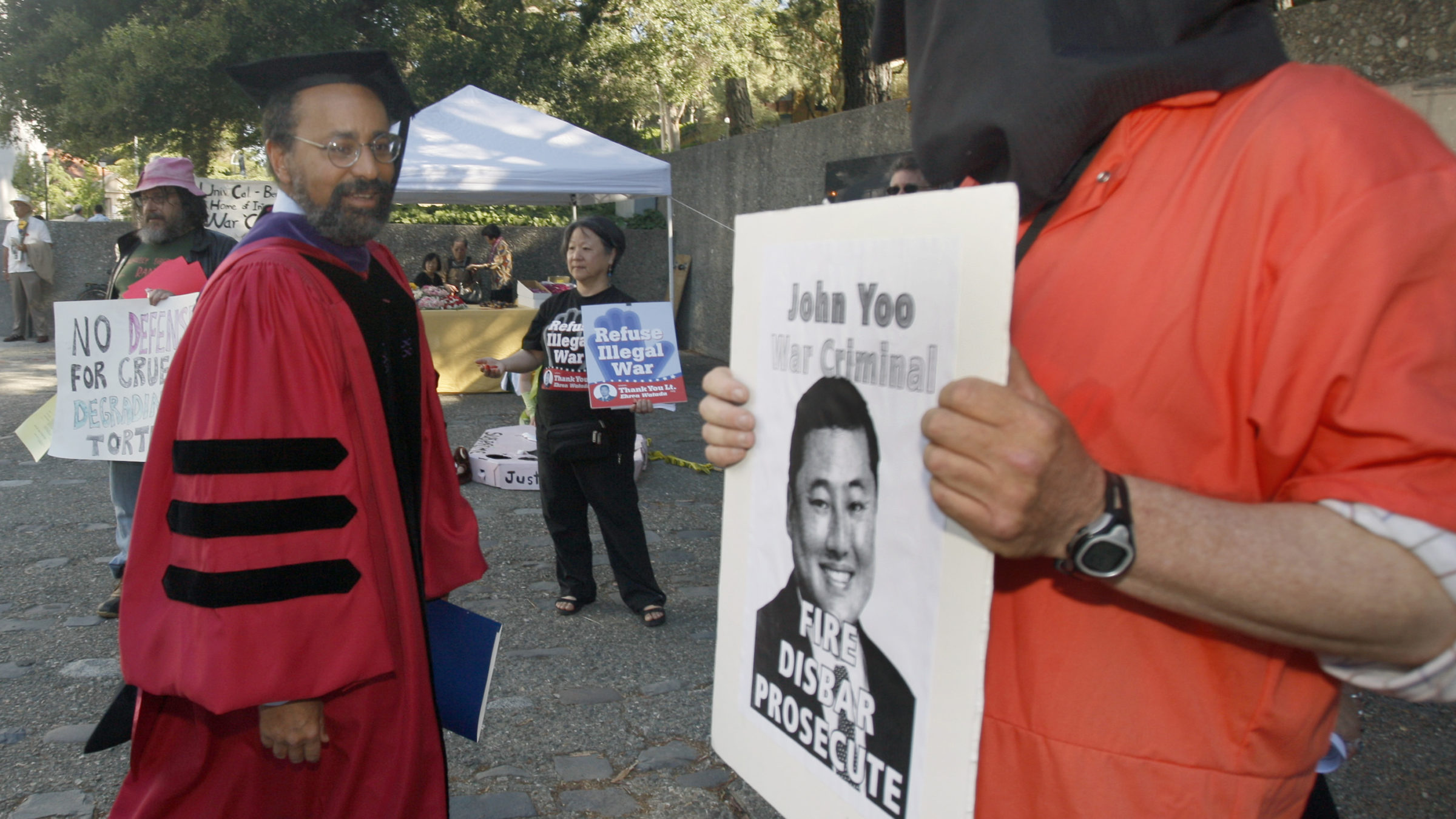
Protesters confront Berkeley Law Dean Christopher Edley at graduation on May 17, 2008 (Photo By Paul Chinn/The San Francisco Chronicle via Getty Images)
This dip into domestic affairs was the beginning of Yoo’s decline. In 2016, like every other fancy Republican lawyer, he abhorred Trump before becoming a reluctant and then enthusiastic fan. He started publishing increasingly niche law review articles about whatever the Trump priority of the day was—abolishing national monuments, the Space Force, impeachment—but it was never enough to get that judicial nomination he coveted.
As I’ve written for this site, when the Trump administration was drawing to a close, Yoo wasn’t even the first to argue that the Twelfth Amendment enabled Mike Pence to steal the 2020 presidential election. Instead, he was beaten to the punch by John Eastman, of all people, who is so dumb that he once tried to get the Supreme Court to rule that Congress doesn’t have the authority to spend money. Bested by charlatans like that, Yoo would never be the first to crack a nut like the Geneva Conventions again.
That pattern continues in Yoo’s most recent law review article, “Emergency Powers During a Viral Pandemic.” As you might be able to guess from the title, Yoo has suddenly rediscovered serious constraints on the presidency now that a Democrat occupies the office. But just like with the Twelfth Amendment, he’s late to the party.
The article focuses on the Centers for Disease Control’s COVID-19 eviction moratorium and the Occupational Safety and Health Administration’s vaccine mandate—two areas in which landlords and business owners bitterly contested federal authority and ultimately persuaded the Supreme Court to throw both policies out. The article isn’t so much a nuanced examination of administrative agencies’ authority to enforce federal laws as it is John Yoo’s unearned victory lap celebrating someone else’s Supreme Court wins a year later.
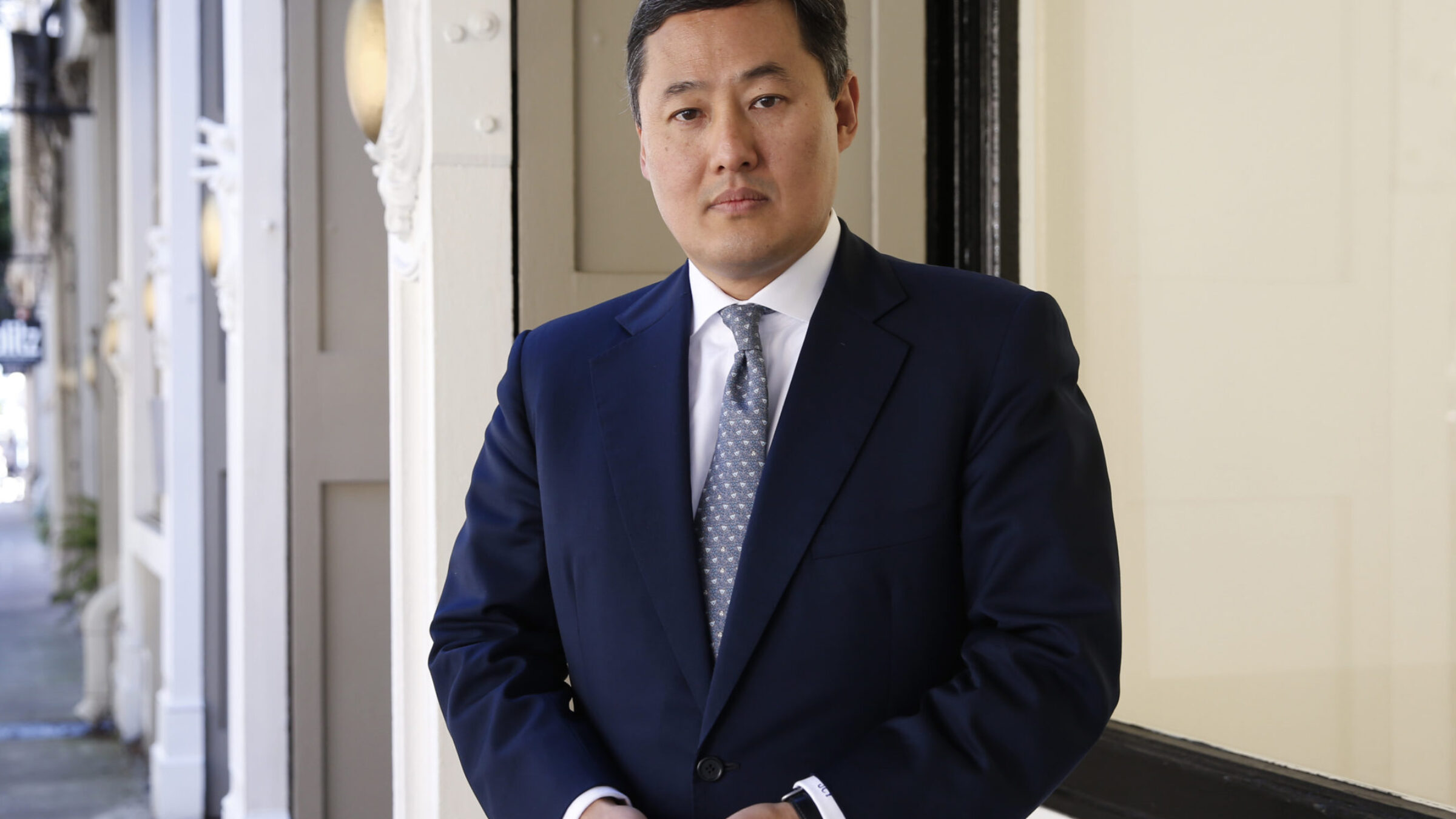
When you helped write the Torture Memos and know how to stand (Photo By Michael Macor/The San Francisco Chronicle via Getty Images)
Even under these circumstances, Yoo apparently feels the need to rewrite history. The CDC eviction moratorium, which started under the Trump administration and ended several months after President Joe Biden took office, somehow becomes “the Biden Administration’s effort to ban evictions nationwide.” The proposed OSHA rule, which required large employers to ensure their employees get vaccinated, somehow becomes Biden’s “nationwide vaccine mandate,” even though it wouldn’t have applied to anywhere near the whole country. It’s not clear whether Yoo is doing this to troll left-wing readers or just because he’s a moron. At this point in his career, I feel compelled to say it’s the latter.
Significantly, Yoo’s analysis ignores federal pandemic responses that the Court didn’t overturn—most importantly, the vaccine mandate for health care workers promulgated by the Centers for Medicare and Medicaid Services. The old Yoo would have gladly taken on this fight, searching out some way to declare that this, too, was a brazen and unconstitutional overreach that the Court was wrong to allow. But today’s Yoo is too soft. Instead of dealing with this challenge to his conception of executive power, he ducks it. Although he cites sources that explicitly compare the CMS rule with the OSHA rule, he can’t bring himself to acknowledge it.
This is how it ends for John Yoo: His legal thinking keeps getting less bold, less vicious, more circular. This once-proud man, this legal titan of the neocons, is reduced to chasing Trump’s star to avoid the irrelevance that threatens to overtake him at any moment. But it’s hard for me to take too much joy in seeing a war criminal begging for the limelight again. We’re all just watching a guy be bad at his job in public.
